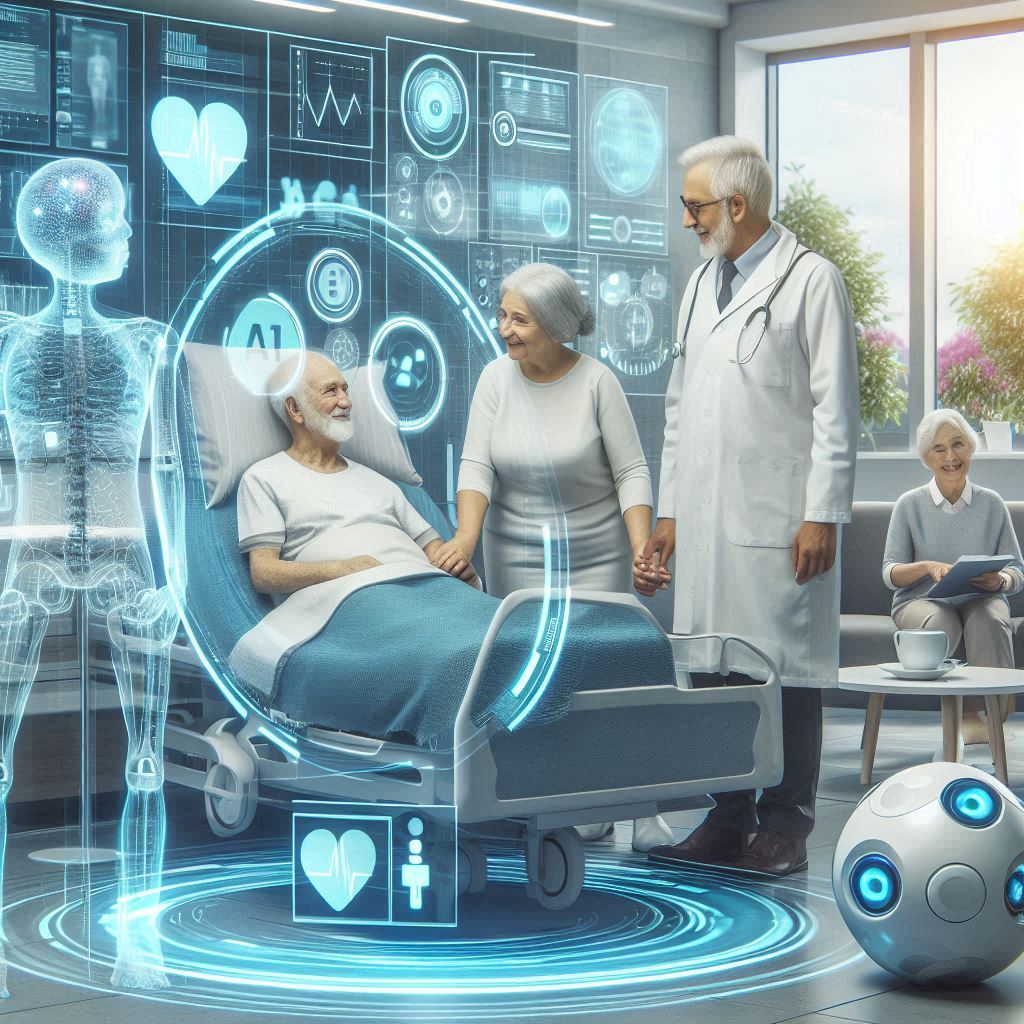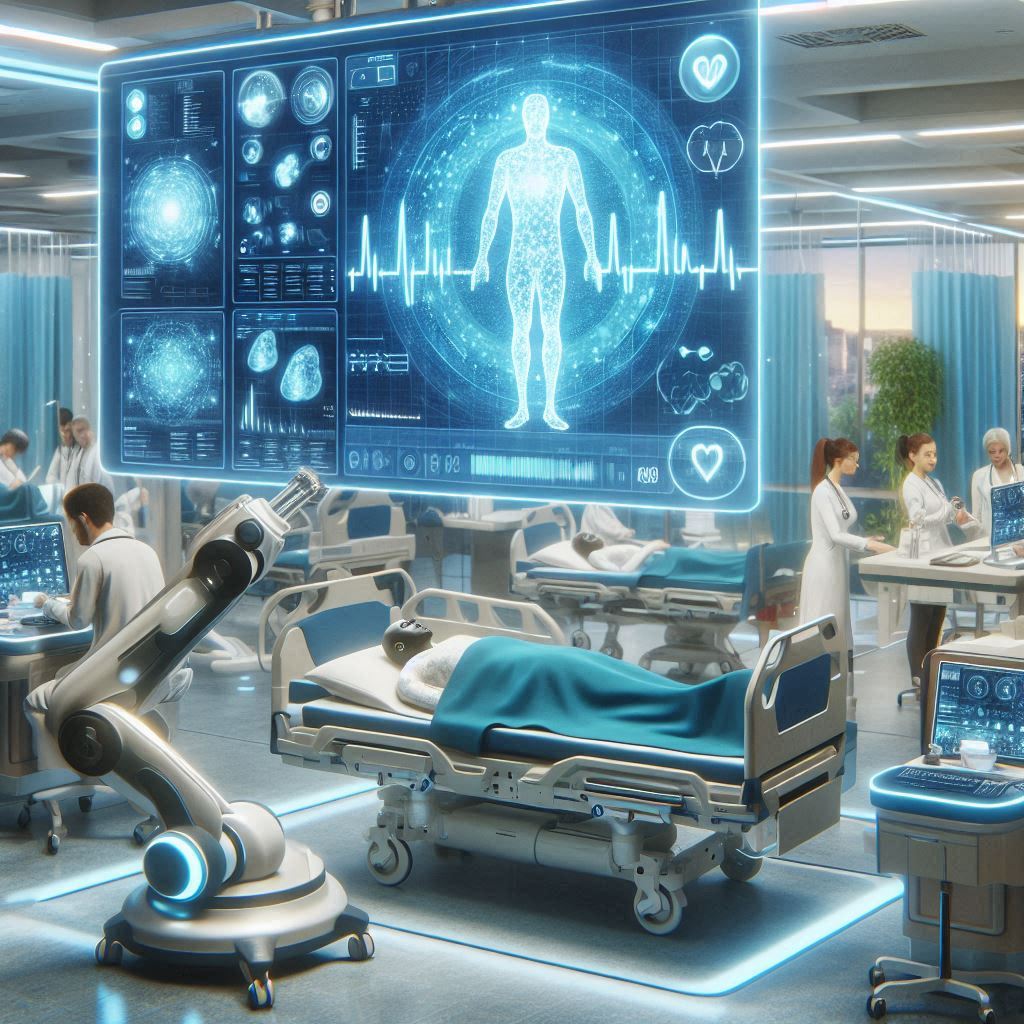Introduction
Artificial Intelligence (AI) is revolutionizing various industries, and healthcare is no exception. From diagnostics to personalized treatment plans, Artificial Intelligence is making significant strides in improving healthcare outcomes. This blog post explores the latest trends in AI in healthcare, its benefits and challenges, and the future prospects of this transformative technology.
The Role of AI in Healthcare
AI in healthcare encompasses a wide range of applications, including machine learning (ML), natural language processing (NLP), and robotics. These technologies are being used to analyze complex medical data, predict patient outcomes, and assist in clinical decision-making. Here are some key areas where AI is making an impact:
- Diagnostics: Artificial Intelligence algorithms can analyze medical images, such as X-rays and MRIs, with high accuracy, helping doctors diagnose conditions like cancer and fractures more quickly and accurately.
- Personalized Treatment Plans: AI can analyze a patient’s genetic information, lifestyle, and medical history to create personalized treatment plans that are more effective than one-size-fits-all approaches.
- Predictive Analytics: AI-powered predictive analytics can forecast disease outbreaks and patient health outcomes, enabling proactive healthcare measures.
- Telemedicine: AI-driven telemedicine platforms facilitate remote consultations, making healthcare more accessible, especially in underserved areas.
- Robotics: AI-powered robots assist in surgeries, providing precision and reducing the risk of human error.

Latest Trends in Artificial Intelligence in Healthcare
- Generative AI: Generative AI is being used to create synthetic medical data, which can be used for research and training purposes without compromising patient privacy. This technology is also being explored for drug discovery and development.
- Natural Language Processing (NLP): NLP is improving the way healthcare professionals interact with electronic health records (EHRs). AI can extract meaningful insights from unstructured data, such as clinical notes, and streamline administrative tasks.
- AI in Radiology: AI is enhancing radiology by providing tools that can detect anomalies in medical images with high precision. This not only speeds up the diagnostic process but also reduces the workload on radiologists.
- Telemedicine and Remote Monitoring: AI-powered telemedicine platforms are becoming more sophisticated, offering features like real-time health monitoring and virtual health assistants. These platforms are particularly beneficial for managing chronic diseases.
- AI in Drug Discovery: AI is accelerating the drug discovery process by predicting how different compounds will interact with targets in the body. This can significantly reduce the time and cost involved in bringing new drugs to market.
Benefits of Artificial Intelligence in Healthcare
- Improved Accuracy: AI algorithms can analyze vast amounts of data with high accuracy, reducing the likelihood of human error in diagnostics and treatment.
- Cost Efficiency: AI can streamline administrative tasks and optimize resource allocation, leading to cost savings for healthcare providers.
- Enhanced Patient Care: AI enables personalized treatment plans and real-time health monitoring, improving patient outcomes and satisfaction.
- Accessibility: AI-driven telemedicine platforms make healthcare more accessible to people in remote and underserved areas.
- Research and Development: AI accelerates research by analyzing large datasets and generating insights that can lead to new treatments and therapies.

Challenges of AI Adoption in Healthcare
- Data Privacy and Security: The use of AI in healthcare involves handling sensitive patient data, raising concerns about privacy and security. Ensuring compliance with regulations like HIPAA is crucial.
- Bias in AI Algorithms: AI algorithms can inherit biases from the data they are trained on, leading to disparities in healthcare outcomes. Addressing bias in AI is essential for equitable healthcare.
- Integration with Existing Systems: Integrating AI solutions with existing healthcare systems can be challenging because of compatibility issues and the need for significant infrastructure upgrades. Additionally, many healthcare organizations may lack the technical expertise or resources required to implement these advanced technologies effectively. Consequently, addressing these challenges will require not only investments in infrastructure but also collaboration between technology providers and healthcare institutions. In the long run, successful integration will rely on creating seamless systems that support both AI innovation and traditional healthcare processes.
- Regulatory Hurdles: The regulatory landscape for AI in healthcare is still evolving. Ensuring that AI solutions meet regulatory standards is a complex and ongoing process.
- Ethical Considerations: The use of AI in healthcare raises ethical questions about its influence on decision-making and the risk of job displacement for workers. Concerns about data privacy, algorithmic bias, and accountability further complicate AI adoption in medicine. Establishing clear ethical guidelines and safeguards is essential for responsible AI use, balancing innovation with human rights protection and trust in healthcare systems.

Future Prospects of AI in Healthcare
The future of AI in healthcare looks promising, with several exciting developments on the horizon:
- AI-Enhanced EHRs: AI will enhance EHR systems, making them more intuitive and better at providing actionable insights to healthcare providers.
- Robotics in Surgery: AI-powered robots in surgery will become more common, offering greater precision and faster recovery times for patients.
- AI-Driven Drug Development: AI will be key in identifying new drug candidates and predicting their efficacy, speeding up development.
- Personalized Medicine: AI will enable more personalized approaches to treatment, taking into account individual genetic profiles and lifestyle factors.
- Global Health Initiatives: AI will address global health challenges by predicting and managing disease outbreaks and improving healthcare access in low-resource settings. It will also enhance the efficiency of health interventions, reduce care disparities, and enable quicker responses to emerging health threats. In this way, AI can contribute significantly to global health equity and resilience.

Conclusion
AI is transforming healthcare in profound ways, offering new opportunities to improve patient care, reduce costs, and advance medical research. However, while there are challenges to overcome, the potential benefits of AI in healthcare are immense. As a result, as technology continues to evolve, AI will play an increasingly important role in shaping the future of medicine and making healthcare more efficient, accessible, and personalized. Ultimately, this shift will pave the way for a more advanced and patient-centered healthcare system.



10 comments
temporary mail
October 12, 2024 at 12:49 pm
Very well presented. Every quote was awesome and thanks for sharing the content. Keep sharing and keep motivating others.
temporary email
October 12, 2024 at 2:08 pm
This is really interesting, You’re a very skilled blogger. I’ve joined your feed and look forward to seeking more of your magnificent post. Also, I’ve shared your site in my social networks!
disposable gmail
October 14, 2024 at 1:05 pm
I do not even understand how I ended up here, but I assumed this publish used to be great
BYU Cougars
October 15, 2024 at 5:01 pm
BYU Cougars I’m often to blogging and i really appreciate your content. The article has actually peaks my interest. I’m going to bookmark your web site and maintain checking for brand spanking new information.
GlobalBllog
October 16, 2024 at 12:43 pm
GlobalBllog naturally like your web site however you need to take a look at the spelling on several of your posts. A number of them are rife with spelling problems and I find it very bothersome to tell the truth on the other hand I will surely come again again.
Blue Techker
October 21, 2024 at 10:07 pm
Blue Techker This is really interesting, You’re a very skilled blogger. I’ve joined your feed and look forward to seeking more of your magnificent post. Also, I’ve shared your site in my social networks!
Mangaclash
October 25, 2024 at 1:29 pm
Mangaclash You’re so awesome! I don’t believe I have read a single thing like that before. So great to find someone with some original thoughts on this topic. Really.. thank you for starting this up. This website is something that is needed on the internet, someone with a little originality!
Mountsinai
November 7, 2024 at 10:52 am
Mountsinai This was beautiful Admin. Thank you for your reflections.
tlovertonet
November 22, 2024 at 2:00 pm
Whats Taking place i’m new to this, I stumbled upon this I’ve discovered It absolutely helpful and it has aided me out loads. I’m hoping to give a contribution & assist different users like its helped me. Good job.
binance kaydi
March 1, 2025 at 10:45 am
Your article helped me a lot, is there any more related content? Thanks!